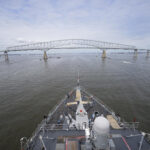DomPrep’s John Morton met with Rear Admiral Joseph Nimmich, USCG, Director, Maritime Domain Awareness (MDA) Strategy. Rear Admiral Nimmich spells out details of the DHS October 2005 plan to implement a Maritime Domain Awareness (MDA) architecture that goes beyond pure intelligence sharing to include broad information sharing. How the MDA architecture will network national as well as interagency, state, local, and private-sector assets to create a common information environment for anomaly detection and command and control (C2).
DomPrep has divided the 29 minute 25 second interview into five segments.
Listen to Audio Segment One The DHS National Plan to Achieve Maritime Domain Awareness
MDA and the role of the Joint Coast Guard/Navy National Maritime Intelligence Center (NMIC) in Suitland, Maryland, as the central point to fuse, analyze, and disseminate intel for shared situational awareness. National, regional, and local nodes that interact with NMIC for a common MDA implementation environment. Moving away from a “Maritime NORAD” concept to a National MDA concept of operations (ConOps).
Duration: 8 Minutes 43 Seconds
Listen to Audio Segment Two Partners and Information Sharing
Applying U.S. Northern Command (NorthCom) and other national intelligence, surveillance, and reconnaissance (ISR) assets to support MDA. Coordination and collaboration with federal, state, local, tribal, and international stakeholders, and the private sector, to implement the MDA architecture. The Port of Charleston, South Carolina, and its Seahawk as an MDA model. How MDA goes beyond intelligence sharing to broad information sharing.
Duration: 4 Minutes 28 Seconds
Listen to Audio Segment Three Anomaly Detection
Anomaly detection as a key output from MDA. The Automaticentification System (AIS) and other vessel-tracking reporting systems and the need for a secondary means to validate voluntary reporting. MDA and arriving at information and sensor rule sets for watchstanders for anomaly detection. How MDA serves command and control: a walk-through by Admiral Nimmich of an interdiction scenario that uses MDA inputs.
Duration: 5 Minutes 23 Seconds
Listen to Audio Segment Four Private-Sector Stakeholders
The argument that validated automatic reporting systems can enhance the efficient flow of commerce. The need to secure such reporting systems against hackers and for protocols to protect private-sector proprietary information vital to competitive advantage.
Duration: 4 Minutes 19 Seconds
Listen to Audio Segment Five Programs, Budgets, and Interagency Buy-Ins
Interagency input into the DOD and DHS MDA budgets. Sensors and platforms serving MDA– from the USCG’s Deepwater assets to DOD programs to improve acoustic contactentification, data management, and stand-off detection (e.g., acoustic sensors, unmanned aerial vehicles, (UAVs), and aerostats).
Duration: 6 Minutes 22 Seconds

Joseph L. Nimmich
Rear Admiral Nimmich assumed his current position as Director of the Maritime Domain Awareness Program Integration Office in May of 2005. Prior to this assignment, he served as Deputy Chief of Staff of the Coast Guard. Rear Admiral Nimmich has enjoyed a balanced 27-year career dividing his service between operational assignments ashore and afloat and staff assignments in the resource management field. A native of Huntington, New York, he is a 1977 graduate of the United States Coast Guard Academy, earning a Bachelor of Science degree in History and Government. He has his Masters Degree in Business Administration from the Stern School of Business and attended Army War College in Carlisle, PA where he earned a Masters Degree in Strategic Studies. Rear Admiral Nimmich has served aboard the USCGC's WOODRUSH and MESQUITE and has commanded the Cutters POINT ESTERO, RED BEECH, and SORREL. Rear Admiral Nimmich has also served as Commander, Coast Guard Group Key West and has held various staff assignments in both Districts and Headquarters including the Office of Operational Law Enforcement, the Office of Budget and Planning and Policy.
-
Joseph L. Nimmichhttps://domesticpreparedness.com/author/joseph-l-nimmich






